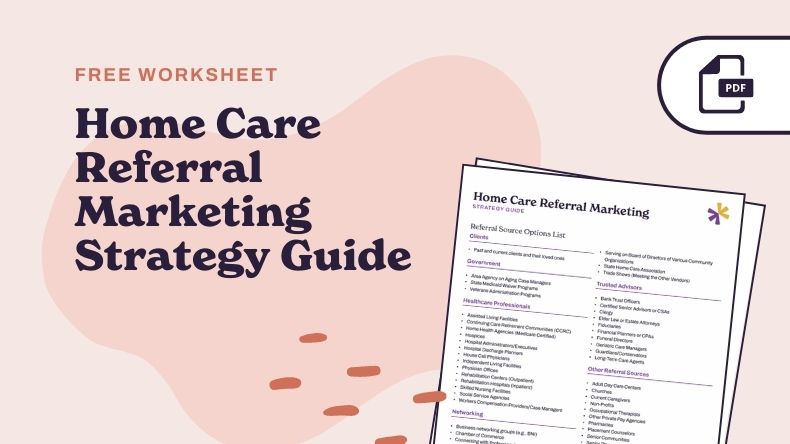Setting yourself apart from the crowd is what separates the ultra-successful from the also-rans. In this article we’ll explore five ways to do it by boosting customer and employee satisfaction.
Differentiation is the name of the game when it comes to business success. But how do you differentiate your post-acute care business from a very crowded field? Marketing campaigns, social media presence, and even facility upkeep can drive short-term wins. But for lasting separation that drives sustained growth and success, customer and employee satisfaction are linchpins.
High satisfaction ensures you retain the customers and employees you currently have, generate referrals for new ones, and put you on the path to award-winning performance—all of which set you apart as a provider.
But what are the keys to unlocking these doors to differentiation? We reviewed data from more than 18,000 monthly surveys and came up with five data-driven best practices to boost employee and/or customer satisfaction while simultaneously helping you stand out from the crowd.
5 Ways to Improve Satisfaction and Differentiate Your Post-Acute Care Business
1. Focus on the first 100 days
Why the first 100 days?
HCP research shows that nearly 40% of all new hires leave within the first 100 days on the job. And that number isn’t showing signs of improving. In fact, according to the 2023 HCP Benchmarking Report (BMR), turnover spiked 12% to a staggering 77.1% annual rate in the last year after staying steady for the previous three.
This is why it’s critical to immediately gather, evaluate, and act on employee feedback, then continue doing so through their first 100 days. We recommend 15 days, 30 days, 60 days, and 90 days.
Opening the lines of communication, encouraging employees to provide feedback, actively listening to or monitoring that feedback, and quickly acting on it are major satisfaction drivers. Doing this at the beginning of a person’s tenure with your company tells them they can expect to continue enjoying the same satisfactory experience, thus distinguishing you as an employer of choice.
2. Pave a path to career success with compliance and specialty training
Reciprocity is extremely powerful. A large portion of the public are driven by a need (or at least a desire) to repay a good deed. Putting your employees on a path to greater success through career advancement is a lever you can pull to trigger this desire to reciprocate by staying with the employer that made it possible. Compliance and specialty training both enable employees to advance their careers and improve current performance.
While training for compliance is the first step, data from the 2023 HCP Benchmarking Report also shows that those who offer five additional hours of training (orientation & ongoing) in home care, or eight additional hours for home health and hospice, differentiate the providers who aren’t impacted by staffing shortages from those who are extremely impacted.
On average, home-based care agencies that offer at least eight orientation hours and 12 ongoing hours of training, increased revenue by $681,672. So, ask your employees what they wish they knew and get them the training to make their wishes come true. They’ll likely repay you in kind by remaining on your staff and encouraging their peers to join them.
3. Earn referrals from employees and customers
There’s arguably no greater sign of satisfaction than for your employees to direct their peers to seek out your openings, or for patients and family members to recommend you to others in need of care.
According to the 2023 HCP Benchmarking Report, past and current customer referrals are the top marketing source with the lowest turnover rate for home care, home health, and hospice. Referral marketing generates more than 1/3 of all revenue.
Generating positive reviews—especially online where they’re highly visible—is a must for your differentiation strategy. Word-of-mouth referrals may be the crème de la crème for trustworthiness, but online reviews and ratings are often the first source a potential customer or job candidate turns to when seeking out a product, service, or employer.
According to research from Zippia, 93% of people say reading online reviews has affected their buying decisions and 81% of people read online reviews before visiting a business in person.
LinkedIn data shows that nearly 3/4 of all candidates research a company before applying.
Needless to say, a strong online reputation carries a lot of weight when people compare you to the competition.
4. Collect, inspect, and respond to feedback
Poor or inadequate communication from providers has been a top complaint among employees and customers for years.
Great communication (and resulting satisfaction) starts with listening, and soars when you respond. Survey your employees and customers, put their feedback under the microscope, and respond quickly to enhance engagement and build a stronger relationship.
HCP research shows that responding to just one comment in an employee survey reduces the likelihood of turnover by 65%. And, according to the 2023 BMR, providers who gather and act on customer feedback retain those customers 20% longer.
Better communication leads to happier employees and customers. Happier employees and customers lead to differentiation through positive reviews, more referrals, and award-worthy performance.
5. Set award-winning standards
If automobile manufacturers have taught us anything, it’s that awards influence the masses. Try to find a car or truck commercial that doesn’t tout a JD Power award or similar accolade. The post-acute care industry isn’t any different when it comes to the power of awards. But that power extends beyond its positive impact on a patient, resident, or family member shopping for care providers.
Going after industry accolades creates a sense of purpose among employees that supercharges their engagement levels. Even when additional work is required to qualify for, or achieve the recognition, the sense of purpose and satisfaction derived from operating at an award-wining level often outweighs the extra output required to do so.
A study by AHCA and Pinnacle Quality Insight on the correlation between awards and satisfaction levels revealed that employee satisfaction and engagement spikes significantly in the year leading up to winning a National Quality Award when extra work and higher performance would typically be required.
Once an award is achieved, it’s essential to recognize the people who made it possible and celebrate the success. Staff recognition and appreciation received the lowest satisfaction score among employees in the 2023 BMR. Celebrate your staff publicly to make them feel appreciated and watch their satisfaction levels skyrocket.
Finally, don’t be modest about your accomplishment. Spread the word to the public via advertising, social media channels, and in press releases to assert your company as the best of the best; doing so can sway uncertain customers and job candidates in your direction.
Where to start?
The first step towards differentiating your post-acute care business through higher customer and employee satisfaction is knowing where you currently stand. Measure your satisfaction survey data to establish a baseline and use one or all the aforementioned tactics to start climbing from there. If you need a tool to help with either, reach out to an HCP Solutions Specialist who can recommend the perfect product.








